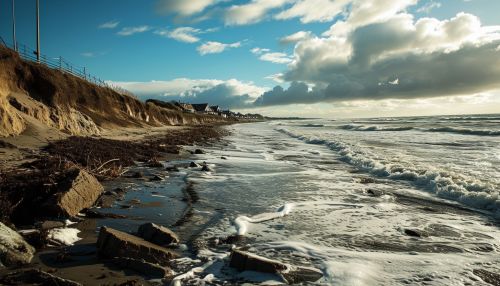Effects of Climate Change on Oceans
Introduction
Climate change, a long-term shift in global or regional climate patterns, has profound impacts on the world's oceans. These impacts range from changes in sea levels, ocean heat content, water quality, and marine ecosystems. The effects of climate change on oceans are complex and far-reaching, affecting not only marine life but also the global climate system and human societies that depend on the oceans for food, livelihood, and other services.
Sea Level Rise
One of the most visible and significant effects of climate change on oceans is sea level rise. As global temperatures increase, the oceans absorb much of this excess heat, causing seawater to expand, a process known as thermal expansion. This, combined with the melting of land-based ice such as glaciers and ice sheets, contributes to rising sea levels.


Sea level rise poses a serious threat to coastal communities, infrastructure, and ecosystems. It can lead to increased coastal erosion, higher storm surge damage, and the inundation of low-lying areas. In some cases, entire islands and coastal regions may become uninhabitable.
Changes in Ocean Heat Content
The oceans serve as a major heat reservoir, absorbing and storing heat from the atmosphere. With the increase in greenhouse gas emissions, more heat is being trapped in the Earth's system, a significant portion of which is absorbed by the oceans. This increase in ocean heat content can have various impacts.
Higher ocean temperatures can lead to the bleaching of coral reefs, a phenomenon where corals expel the symbiotic algae living in their tissues, causing them to turn completely white. This not only affects the aesthetic value of these ecosystems but also their biodiversity, as many marine species depend on coral reefs for habitat and food.
Increased ocean heat content can also affect ocean circulation patterns, which in turn can influence weather and climate patterns. For instance, it can lead to more intense hurricanes and typhoons, as these storms draw their energy from warm ocean waters.
Ocean Acidification
Another major effect of climate change on oceans is ocean acidification. As the concentration of carbon dioxide (CO2) in the atmosphere increases, more of it is absorbed by the oceans. In the water, CO2 reacts with seawater to form carbonic acid, which then dissociates to form bicarbonate ions and hydrogen ions. The increase in hydrogen ions leads to a decrease in pH, making the ocean more acidic.
Ocean acidification can have serious impacts on marine life, particularly organisms that build shells or skeletons out of calcium carbonate, such as corals, mollusks, and some types of plankton. The increased acidity can make it difficult for these organisms to maintain and build their shells, potentially leading to population declines and disruptions to the larger marine food web.
Changes in Marine Ecosystems
Climate change can also lead to shifts in marine ecosystems. Changes in sea temperature, ocean acidity, and nutrient availability can alter the distribution and behavior of marine species. For instance, some species may shift their ranges poleward in response to warming waters, potentially leading to changes in community composition and interactions among species.
In addition, changes in ocean conditions can affect the timing of biological events, such as reproduction and migration, a phenomenon known as phenology. Changes in phenology can disrupt the synchrony between different species, such as predators and their prey, potentially leading to cascading effects throughout the ecosystem.
Conclusion
The effects of climate change on oceans are diverse and significant, affecting everything from sea levels to marine ecosystems. These changes not only threaten the health and diversity of marine life but also have profound implications for human societies that rely on the oceans. As such, understanding and addressing the impacts of climate change on the world's oceans is a critical challenge for the 21st century.
